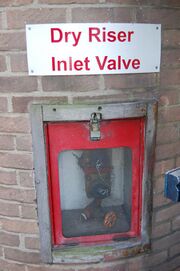Engineering:Dry riser


A dry riser is a normally empty pipe that can be externally connected by firefighters to a pressurised water source. It is a vertical pipe intended to distribute water to multiple levels of a building or structure as a component of the fire suppression systems.
Most buildings have a "wet riser" or "wet standpipe" system where the pipes are kept full of water for manual or automatic fire fighting operations. Dry risers are used when the water pressure of a building is insufficient for fire suppression and in unheated buildings where pipes could freeze. In the UK, dry risers must allow fire engine access within 18 m of the dry riser inlet box.[1] Dry risers in occupied buildings must be within a fire-resistant shaft, usually one of a building's fire escape staircase enclosures. The riser is also where the gauges, valves, and alarm devices are located.
Depending on regional nomenclature, the term "dry riser" may refer to a standpipe, intended to provide water to fire hose connections, or a vertical main pipe in an automatic dry pipe fire sprinkler system. A dry standpipe has an external fire department connection at ground level, such as a Storz coupling, through which water can be pumped from the fire engine pump to the fire hose attachments on each floor. A dry pipe fire sprinkler system is a network of pipes connected to fixed sprinklers inside a building, which is full of air until one of the sprinklers is triggered.
See also
- Fire fighting
- Fire sprinkler
- Siamese connection
- Standpipe (firefighting)
References

